The farmers’ market at Abbotsford Convent
The farmers’ market at Abbotsford Convent now has a new name (Abbotsford Convent Farmers’ Market) and a new operator (Melbourne Farmers’ Markets) but is at the same place (Abbotsford Convent) and time (4th Saturday of the month, 8am-1pm). So, the next market is on next Saturday, 23rd February.
One of the things that I like about Melbourne Farmers’ Markets’ markets is that they publish a list of stallholders in advance of each market. The convent market’s stallholders who are local to North East Melbourne include Chef’s Fine Food, City Larder, Cocoa Rhapsody, Eureka Coffee, Gourmet Pies, Kinglake Vegetables, Offaly Good Food, Plough To Plate, Take Me Home and The Mushroom Co.
Melbourne Farmers’ Markets now effectively have a weekly circuit of farmers’ markets in the City of Yarra: Abbotsford Convent (4th Saturdays), Carlton (1st and 3rd Saturdays) and Collingwood Children’s Farm (2nd Saturdays)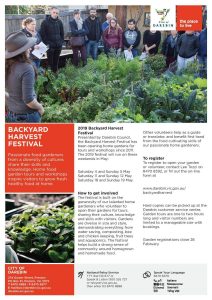 .
.
Darebin Backyard Harvest Festival
The Darebin Backyard Harvest Festival is taking place on the first three weekends in May. If you would be potentially interested in opening your garden or volunteering, contact Lee Tozzi by phone (8470 8392) or email, or fill in their online form.
News about local food producers
Fritz Gelato (Richmond) and That’s Amore Cheese (Thomastown) both won gold medals in the 2019 Australian Grand Dairy Awards.
Kooinda Boutique Brewery (Heidelberg West) is closing its bar. It’s still continuing to make its beer, though.
Local food organisations in the news
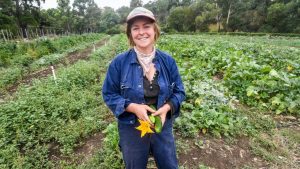 Emily Connors (pictured), from CERES Joe’s Market Garden, has been interviewed by The Age.
Emily Connors (pictured), from CERES Joe’s Market Garden, has been interviewed by The Age.
Ben Moore, from Ben’s Bees (Blackburn North), has been interviewed about various aspects of pure honey. Watch the video (5 minutes).
More on growing turmeric in Melbourne
Last week’s articles on growing turmeric in Melbourne have generated further discussion this week.
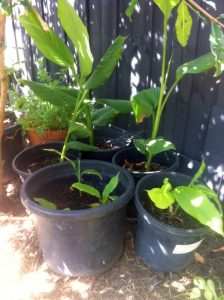 David Wakeham has written in to say that he has grown turmeric quite successfully in pots for the past two years (see picture right). Here, in its entirety, is his growing guide: “Basically put it in a shady spot and forget about it.“
David Wakeham has written in to say that he has grown turmeric quite successfully in pots for the past two years (see picture right). Here, in its entirety, is his growing guide: “Basically put it in a shady spot and forget about it.“
Angelo Eliades has written a second article, this one entitled Growing turmeric in the ground in temperate climates (his article last week was about growing turmeric in pots). Whilst David’s advice totals 11 words, Angelo’s weighs in at around 2,000.
Angelo doesn’t blog much but, when he does, it is usually worth reading. To help you, all of his posts about food growing can be now be easily accessed from this page on our website.
What to plant after tomatoes and potatoes?
Stephen Brennan writes in “What is the best thing to plant in my veggie garden after a crop of tomatoes and potatoes?“
My reply: a list of the possibilities is provided on our website on the veggie seeds that can be planted in February page. If you wait a few weeks, this list will be updated to March and will become longer. None of the veggies listed are from the same family as tomatoes and potatoes (solanums) and so any of them can be planted after tomatoes and potatoes.
Mac’s tip for February – seed saving
As many of you will know, newsletter reader Mac McVeigh used to write food growing tips for this newsletter. Maybe he will again in the future. But anyway, some of his tips are particularly pertinent at particular times of year and so some newsletter readers (well, my wife actually) have suggested that, on occasion, I should draw your attention to selected tips. For example, here is one from February last year on the subject of seed saving.
Whilst in the midst of your peak harvest period, take time to appreciate the ‘star performers’ in your veggie patch. If one of your plants is far more vigorous or productive than the others then, hey, why not collect the seed from that plant to sow in future years? Beans, capsicums, chillies, lettuce, peas and tomatoes are considered the easiest to save because they all produce seed in the same season as they are planted and all are self-pollinating. Only the seeds from open-pollinated, non-hybrid plants will produce a similar crop; in other words, they are the plants most likely to produce offspring (in the form of seed) that closely resemble their parents.
And here is what Robin Gale-Baker said on the subject in her very first contribution to the newsletter: February and March are ideal times for seed collecting – both seed that has dried on the plant and wet seed which has to be extracted, washed and dried. Example wet seeds are tomatoes, pumpkins, zucchini, cucumber and capsicum. Consider collecting both early and late wet seed, particularly tomatoes, thereby selecting for plants that will produce both early and late in the season. Choose the best fruit, label clearly and plant at least one of each. You should be able to extend the tomato season until late May, if not early June.
As Mac and Robin both point out, you should keep back the best seed for planting, rather than follow the obvious course of eating the best and planting the dross. Incidentally, Richard Dawkins said (in The Ancestor’s Tale) that his father found this one of the hardest lessons to get across to farmers in Africa in the 1940s.
If you want to know more about seed saving, an excellent book is The Seed Savers’ Handbook. Both readable and comprehensive, it would be a nice gift for anyone at $32.
And here is a free booklet: A Guide to Seed Saving, Seed Stewardship & Seed Sovereignty.
Fun facts: witlof/witloof
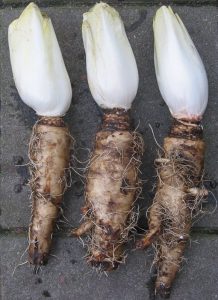
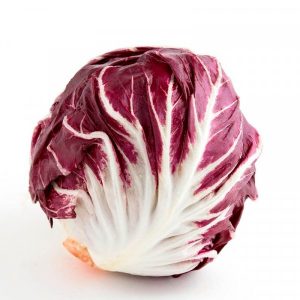 Although they look completely different, witloof and radicchio are actually the same (chicory) plant at different stages in its (artificially managed) life.
Although they look completely different, witloof and radicchio are actually the same (chicory) plant at different stages in its (artificially managed) life.
In the first stage, the plant is grown normally and becomes radicchio or equivalent. The roots (which are parsnip-like) are then dug up and stored for up to a year at 0°C.
In the second stage, the roots are placed into large wooden boxes (without soil, but a bit of nutrient) and kept in the dark. This is a process called hydroponic forcing and results in the witloof.
The process above was accidentally discovered in the 1850s in Belgium and ‘witlof’ is Flemish for ‘white leaf’.
Which link was clicked most times in the last newsletter?
Judy’s write up of her interview with Katrina Forstner.
Joke of the week
How did Reese eat her ice cream? Witherspoon.
New events – not cooking
Retro Suburbia Group: 3rd Wednesdays of the month, 6.30-8.30pm; Lalor Library.
What: Are you interested in downshifting but don’t know where to start? Whether you’re interested in the big picture of how, as communities, we can downshift our energy use, or the details of how you can grow more food for your family, Retro Suburbia is rich with real world examples and behavioural strategies applied by those already on the downshifting path.
Cost: free.
Bookings: just turn up.
Mindful eating workshop – how to break your eat-repent-repeat cycle: Thursday, 28th February, 7-8.30pm; Heidelberg Heights.
What: Join licensed Am I Hungry facilitator and dietitian (APD) Tess Gardiner for an introduction to mindful eating workshop. Learn how you can develop the effective thoughts and positive feelings necessary to make decisions about eating, physical activity, and self-care that support your optimal health. This weight-neutral, inside-out approach changes thoughts and feelings first so that changes in behaviours will last.
Cost: $17.
Bookings: EventBrite.
Lucinda’s permaculture garden: Saturday, 2nd March, 11am-midday; Hurstbridge.
What: On a standard 1/4 acre residential block, Lucinda’s garden is an example of the productivity that can achieved in a small ‘urban’ space. You will see densely planted veggie gardens, mainly in above-ground container gardens such as baths (due to gum trees). There are 23 kinds of fruit trees, 14 kind of berries & vines, 11 kinds of perennial vegetables (including some water plants) and 16 types of herb. There is an orchard, compost bays, weed tea, chook shed, recycled car tyre retaining walls, water gardens, a grey water diversion system, solar hot water and solar PV. Visitors are welcome to take a starter scoby (for kombucha) and/or some sourdough bread starter home with them. Read more about Lucinda’s garden.
Cost: $10.
Bookings: EventBrite.
Okra production with farmer Ajak: Saturday, 16th March, 10.30am-12.30pm; Joe’s Market Garden, Coburg.
What: Farmer Ajak from Okra Connections will take you through the steps from sowing, propagation, irrigation, and other management practices. His wife Rachael will do a cooking demo which showcases the versatility of okra.
Cost: $17.
Bookings: EventBrite.
Fighting food waste: Wednesday, 3rd April, 7-8.30pm; Kew.
What: Did you know that over 40% of the waste in our bins consists of food? You can help us fight the war on this food waste while learning how to get the best from your food for yourself and your family. Join like-minded neighbours at this workshop presented by a sustainable food expert from Cultivating Community. You will learn simple techniques for planning, buying, cooking and storing food.
Cost: free.
Bookings: EventBrite.
Produce in pots: Thursday, 4th April, 6.30-9pm; Bulleen Art and Garden.
What: What you will learn: why edibles fail and what how to improve their chances of success; how to choose the right pots, potting mix, additives and mulches; and the best fruit and vegetables options for pots, and the best sustainable and organic maintenance techniques, including watering and feeding. Presented by Diana Cotter. You’ll learn how potting mix and watering work, how plants react to different situations, and how the weather affects different plants differently. There will be a practical demonstration showing how to properly prepare potting mix, plant seeds and seedlings, and maintain the potential fruits (and vegetables!) of your labour.
Cost: $55.
Bookings: WeTeachMe.
The joy of backyard chooks: Saturday, 6th April, 9.30am-12.30pm; Bulleen Art and Garden.
What: What you will learn: how to get started with keeping chickens in a suburban backyard; how to house and protect chooks from predators; and how chooks can be used to improve your garden and soil. Presented by Sarah Hardgrove. Keeping a few chooks in the backyard used to be a staple of Australian suburban life, and their eggs made up a healthy part of our diet. But even though our house blocks might be shrinking, a smaller backyard doesn’t necessarily mean an end to raising or enjoying them. In this class, you will find out just how easy it is to keep a few hens as pets and as the ultimate garden recyclers, as well as everything you need to know about housing, protecting and feeding them, and lots of practical ideas on how to live harmoniously with them in your garden. Suitable for those who have never kept chooks before.
Cost: $50.
Bookings: WeTeachMe.
Native plants for food and medicine: Saturday, 13th April, 9.30am-12.30pm; Bulleen Art and Garden.
What: What you will learn: traditional Indigenous lifestyles and healing practices pre European settlement; traditional ways of using various Indigenous plants for medicinal purposes; and promising new research into their potential medical applications. Presented by Gaby Harris. Indigenous Australians have been using native plants and animals for tens of thousands of years as sources of food and medicine. With European settlement much of this knowledge was lost or ignored, but there is now growing interest in relearning these traditional healing methods. More research is being carried out to see how we can grow, harvest and utilise our Indigenous plants for foods, medicines, cosmetics and more. This class will introduce you to some of the well-known, as well as some more obscure, Indigenous Australian plants, teach you how they were once used, and how you can use them now. You will be able to see, smell and taste a variety of these amazing plants and learn where you can find them and how to cook with them.
Cost: $55.
Bookings: WeTeachMe.
Good garden bugs: Saturday, 13th April, 1-4pm; Watsonia Library.
What: This workshop will be delivered by two entomologists. You will learn about pest and beneficial insects; have hands-on training in insect identification (using live and preserved samples); and participate in an interactive Q&A session covering practical and sustainable management options for pests.
Cost: free.
Bookings: their website.
Gardening with kids: Tuesday, 16th April, 10-11.30am; Bulleen Art and Garden.
What: What you will learn: how to grow fresh produce in your own backyard and have heaps of fun doing it; how common household items can be reused in the garden; and how ‘good bugs’ can help you to look after your veggie patch. Presented by Nicole Griffiths. Growing food is a great way for children to connect with the natural environment and to develop an appreciation for the food that they eat. It also happens to be heaps of fun. In this hands-on class, you will explore some easy and inexpensive ways to grow food at home, regardless of whether you have an acre of land or just a windowsill. Children (and grown-ups) will get their hands dirty with practical gardening and craft activities using recycled and re-purposed objects. By the end of the class, each student will have made a variety of goodies to grow and use in their gardens at home. The class is suitable for children aged 5 to 10 and children must be accompanied by an adult at all times. Please note that the class cost covers both a child and 1 accompanying adult.
Cost: $30.
Bookings: their website.
Beeswax wraps: Thursday, 18th April, 11am-midday; Diamond Valley Library.
What: Join Ben, from Ben’s Bees, as he shows us how to make beautiful beeswax wraps – a natural and reusable alternative to plastic wrap.
Cost: free.
Bookings: just turn up.
New events – cooking
Sourdough and grain preparation – making grains great!: Thursday, 28th March, 6.30-9.30pm; Ringwood.
What: What you will be told: a brief science and history behind grains, nutritional benefits and cooking techniques; discover different ancient and whole grains; and the ingenious methods of grain preparation our ancestors devised in order to extract the maximum nutrition and flavour from the grains. What you will experience: ancient methods of grain preparation like soaking, sprouting, sour-leavening, and fermentation; prepare and sample four dishes that feature a different grain using different preparation techniques; prepare sourdough bread starter and learn how to care for it; make sourdough pita bread from scratch using sourdough starter; and the opportunity to see, feel, smell and taste a range of grain based dishes. What you will leave with: an appreciation of the health benefits of ancient and whole grains if prepared properly; knowledge and practical experience how to prepare grains in your kitchen; full recipes, instructions and how to’s; and sourdough bread starter and fermented rice starter and instruction on how to care for it.
Cost: $150.
Bookings: their website.
Italian cooking: Thursday, 28th March, 7-8.30pm; Mill Park Library.
What: Join the ladies from Mangia Mangia as they demonstrate traditional Italian recipes. Followed by tastings.
Cost: free.
Bookings: their website.
Easter cupcake decorating demonstration for adults: Monday, 1st April, 10.30-11.30am; Thomastown Library.
What: Irene Williams from the Victorian Cake Decorating Society will show you how to decorate your own cupcakes for Easter.
Cost: free.
Bookings: their website.
Weight loss cooking (thermomix): Tuesday, 2nd April, 7.30-9.30pm; Kilsyth.
What: Learn how your thermomix can help you provide nutritional meals with recipes from a range of weight loss regimes such as low carb keto, high protein, vegetable based. Note this class will not give weight loss advice, but the recipes are easier and cheaper than store-bought weight loss food and without additives.
Cost: $21.
Bookings: EventBrite.
Easter chocolate novelties: Friday, 5th April, 2-3pm; Watsonia Library.
What: Join Irene Williams from the Victorian Cake Decorating Society to make your own chicken on a rocky road nest.
Cost: free.
Bookings: their website.
Kombucha workshop: Saturday, 6th April, 11am-midday; Collingwood Library.
What: Hosted by Fermented Mumma. Learn about a scoby and how to flavour kombucha. You will also take home a copy of instructions and 3 litres of your very own kombucha.
Cost: free.
Bookings: EventBrite.
Summary of upcoming events – not cooking
Over the next week
- Growing bountiful harvests in small spaces: Wednesday, 20th February, 6.15-8pm; Collingwood Childrens Farm, Abbotsford.
- Retro Suburbia Group: Wednesday, 20th February, 6.30-8.30pm; Lalor Library.
- Healthy productive compost and worms: Thursday, 21st February, 6.30-9pm; Bulleen Art and Garden.
- Bee hive tour: Saturday, 23rd February, 10.30am-12.30pm; Rivers of Yarrambat.
- Introduction to permaculture (two sessions): Saturday, 23rd February and Sunday, 24th February, both 10am-4pm; Edendale.
- Brewers Feast Festival: Saturday, 23rd February, 11.30am-8pm; The Abbotsford Convent.
- Fruit beer and cheese pairing masterclass: Saturday, 23rd February, 12.30-2.30pm; Thornbury.
- Seed saving workshop at The Plummery: Sunday, 24th February, starting at 10am; Northcote.
- Weed composting and veggie swap: Sunday, 24th February, 10.30am-midday; Watsonia Neighbourhood House.
- Brewers Feast Festival: Sunday, 24th February, 11am-5pm; The Abbotsford Convent.
- Heritage apple tasting: Sunday, 24th February, 5-7pm; Petty’s Orchard, Templestowe.
- Introduction to horticulture – 9 session course: every Monday for 9 weeks, starting 25th February, 9.30am-3pm; Edendale.
- Farm play: Tuesday, 26th February, 10am-midday; Joe’s Market Garden, Coburg.
- Bush skills and kids farming: Tuesday, 26th February, 4-5.30pm; Joe’s Market Garden, Coburg.
- Growing your veggies: Tuesday, 26th February, 6.30-8.30pm; Fitzroy North.
- Medicinal herbs workshop: Wednesday, 27th February, 6.30-8pm; Whittlesea Library.
Over the next month
- Summer fruit tree maintenance: Thursday, 28th February, 6.30-9pm; Bulleen Art and Garden.
- Mindful eating workshop – how to break your eat-repent-repeat cycle: Thursday, 28th February, 7-8.30pm; Heidelberg Heights.
- Lucinda’s permaculture garden: Saturday, 2nd March, 11am-midday; Hurstbridge.
- Farm play: Tuesday, 5th March, 10am-midday; Joe’s Market Garden, Coburg.
- Bush skills and kids farming: Tuesday, 5th March, 4-5.30pm; Joe’s Market Garden, Coburg.
- The practical beekeeper: Wednesday, 6th March, 1-2.30pm; Rosanna Library.
- Growing fruit and veggies in small spaces: Thursday, 7th March, 6.30-9pm; Bulleen Art and Garden.
- Burnley Brewing tour and tastings: Friday, 8th March, 6.30-7.30pm; Burnley Brewing.
- The art of Japanese breakfast: Friday, 9th March, 8.30-10.30am; Collingwood.
- Vegan vegastation yumcha!: Saturday, 9th March, 11.30am-4.30pm; Fitzroy.
- Vegan smokehouse BBQ collaboration: Saturday, 9th March, midday-2pm; Collingwood.
- Food as medicine: Saturday, 9th March, midday-4pm; Fitzroy.
- Burnley Brewing tour and tastings: Saturday, 9th March, 6.30-7.30pm; Burnley Brewing.
- Vegan smokehouse BBQ collaboration: Sunday, 10th March, midday-2pm; Collingwood.
- Lygon Street – Si Mangia Italiano (film): Sunday, 10th March, 5.30-7.30pm; Cinema Nova, Carlton.
- A slice of spice (curry meets pizza): Monday, 11th March, 6-7.45pm; 400 Gradi, Brunswick East.
- A slice of spice (curry meets pizza): Monday, 11th March, 8-9.45pm; 400 Gradi, Brunswick East.
- Edible weeds: Monday, 11th March, 10am-midday; CERES, Brunswick East.
- Farm play: Tuesday, 12th March, 10am-midday; Joe’s Market Garden, Coburg.
- Bush skills and kids farming: Tuesday, 12th March, 4-5.30pm; Joe’s Market Garden, Coburg.
- Make beeswax wraps: Wednesday, 13th March, 1-3pm; Rosanna Library.
- Richmond Grain Groupies grain crawl: Wednesday, 13th March, 6-9pm; Richmond.
- RetroSuburbia – David Holmgren presents ‘Aussie Street’: Thursday, 14th March, 6.30-9pm; Brunswick.
- Veggie gardening for beginners: Saturday, 16th March, 9.30am-12.30pm; Bulleen Art and Garden.
- Organic gardening for beginners: Saturday, 16th March, 10am-3pm; Edendale.
- The Herb and Chilli Festival: Saturday, 16th March, 10am-5pm; Wandin.
- Okra production with farmer Ajak: Saturday, 16th March, 10.30am-12.30pm; Joe’s Market Garden, Coburg.
- Set up and maintain a worm farm: Saturday, 16th March, 11am-midday; Edendale.
- Success with seedlings: Saturday, 16th March, 2-3.30pm; Central Ringwood Community Centre.
- Great cheese is made in the maturing room: Saturday, 16th March, 4.30-7.30pm; Yarra Valley Dairy, Yering.
- The Herb and Chilli Festival: Sunday, 17th March, 10am-5pm; Wandin.
- Farm play: Tuesday, 19th March, 10am-midday; Joe’s Market Garden, Coburg.
- Bush skills and kids farming: Tuesday, 19th March, 4-5.30pm; Joe’s Market Garden, Coburg.
- Retro Suburbia Group: Wednesday, 20th March, 6.30-8.30pm; Lalor Library.
Summary of upcoming events – cooking
Over the next week
- Tomato relish workshop: Thursday, 21st February, 11am-midday; Diamond Valley Library.
- Cook Indian by the creek: Friday, 22nd February, 6-7.45pm; Diamond Creek.
- No waste cooking workshop: Sunday, 24th February, 10am-2pm; Burnley.
- The Beet Retreat – eating vegan on a budget (4 hour): Sunday, 24th February, midday-4pm; Smiths Gully.
- Preserving your harvest workshop at The Plummery: Sunday, 24th February, starting at 1pm; Northcote.
- Taste of Malaysia (Peranakan): Tuesday, 26th February, 10am-midday; Ringwood North.
Over the next month
- Cook Indian by the creek: Friday, 1st March, 6-7.45pm; Diamond Creek.
- Thermomix Flavours of India – demonstration-style cooking class: Friday, 1st March, 6.30-8.30pm; Chirnside Park.
- Decorating kids cakes with Emelia Jackson: Friday, 1st March, 7-9pm; Gourmet Living, Templestowe.
- Mozzarella and ricotta cheesemaking workshop: Saturday, 2nd March, 9-11.30am; Bee Sustainable, Brunswick East.
- No Waste Cook Club: Saturday, 2nd March, 10am-midday; North Fitzroy Library.
- Nuka zuke – rice bran pickling: Saturday, 2nd March, 11am-1pm; Preston.
- Preserving summer produce: Sunday, 3rd March, 10am-1pm; Fitzroy North.
- Kombucha tea workshop: Sunday, 3rd March, 10.30am-midday; Central Ringwood Community Centre.
- Shio koji making and cooking: Sunday, 3rd March, 11am-1.30pm; Preston.
- Mozzarella and ricotta cheesemaking workshop: Sunday, 3rd March, midday-2.30pm; Bee Sustainable, Brunswick East.
- The Beet Retreat – ‘practically raw’ gluten free vegan un-cooking class (4 hour): Sunday, 3rd March, midday-4pm; Smiths Gully.
- Cooking for baby and toddler (thermomix): Tuesday, 5th March, 7.30-9pm; Kilsyth.
- The Beet Retreat – ‘practically raw’ gluten free vegan un-cooking class: Thursday, 7th March, 6.30-8.30pm; Smiths Gully.
- Cooking master class – Italian feast: Thursday, 7th March, 7-9pm; Gourmet Living, Templestowe.
- Cook Indian by the creek: Friday, 8th March, 6-7.45pm; Diamond Creek.
- Alpha & Omega – Hellenic masterclass: Saturday, 9th March, 11am-1pm; Kew.
- Miso paste making: Saturday, 9th March, 11am-1.30pm; Preston.
- Sourdough bread workshop: Saturday, 9th March, 9-11.30am; Bee Sustainable, Brunswick East.
- Cheese class: Sunday, 10th March, 9.30-11.30am; That’s Amore Cheese, Thomastown.
- Cheese class: Sunday, 10th March, midday-2pm; That’s Amore Cheese, Thomastown.
- Pickle and preserving: Tuesday, 12th March, 7-8.30pm; Hawthorn Community House.
- Cooking master class – ‘lamb madness’: Thursday, 14th March, 7-9pm; Gourmet Living, Templestowe.
- Cook Indian by the creek – Holi special: Friday, 15th March, 6-7.45pm; Diamond Creek.
- Lunch ideas using your thermomix: Tuesday, 19th March, 7.30-9pm; Kilsyth.
- The age-old art of preserving: Wednesday, 20th March, 6.30-9pm; Box Hill North.
